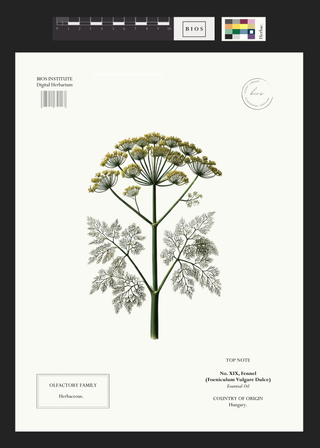

Foeniculum vulgare dulce, commonly known as sweet fennel, is believed to be native to the Mediterranean region, particularly the coastal areas of Southern Europe and Western Asia. It is native to countries such as Italy, Greece, France, Spain, and Turkey. Ours is sourced from Hungary where it is believed to have been introduced in ancient times and has embedded itself into the country’s horticultural and culinary traditions over the centuries.
Fennel has a sweet, warm, and slightly spicy aroma with herbal and anise-like undertones. It provides a unique and distinct fragrance note that can be used in various fragrance compositions.
Fennel is often used as a blending ingredient in perfumery to enhance and modify the overall fragrance. Its aromatic profile can complement and accentuate other notes, adding complexity and richness to the scent composition. It is a Top note found in our Herbaceous family.
Fennel has a strong association with Mediterranean cuisine and culture. Its use in perfumery can evoke a sense of the Mediterranean region, with its warm climate, rich culinary traditions, and herbal fragrances.
Fennel has a long history of use in herbal medicine for its digestive and soothing properties. Its inclusion in perfumery can evoke a sense of herbal remedies and natural wellness.
In perfumery, fennel adds a unique and aromatic dimension to fragrances, contributing to their overall character and olfactory experience. Its association with Mediterranean culture and its herbal and symbolic significance add depth and cultural references to perfumes and fragrance compositions.
Fennel has been used in culinary practices for centuries and is a common ingredient in Mediterranean, Indian, Middle Eastern, and Asian cuisines. It imparts a distinct flavor and aroma to dishes, often described as sweet, licorice-like, and herbal. Fennel seeds, leaves, and bulbs are used in a wide range of dishes, including soups, salads, sausages, and desserts, adding a unique taste to the culinary traditions of these cultures.
In some cultures, fennel is considered a symbol of protection and warding off evil spirits. It has been used in rituals, charms, and amulets to provide spiritual and physical protection. For example, in ancient Rome, fennel was believed to possess protective qualities and was hung over doorways to ward off negative energies.
Fennel has a rich history in traditional medicine and herbal remedies. It has been used for its digestive properties, to alleviate stomach ailments, and to promote overall well-being. Fennel tea, made from the seeds or leaves, is believed to have soothing and calming effects on the body.
Fennel has been mentioned in various mythologies and folklore. In Greek mythology, fennel was associated with Prometheus, who stole fire from the gods and concealed it in a fennel stalk. Fennel was also believed to have magical properties and was used in rituals and ceremonies.
Fennel plays a role in cultural traditions and celebrations. For example, in India, fennel seeds are often consumed after meals as a natural mouth freshener and digestive aid. In some cultures, fennel is incorporated into wedding rituals and celebrations, symbolizing fertility, good luck, and auspicious beginnings.
Fennel
- Unit price
- /per
Please note this product format is a small vial that contains roughly 20 drops of scent concentrate. This can be purchased à la carte but is intended to be used with our Perfume Kit.
SCENT SPECIFICATIONS
Latin Name: Foeniculum Vulgare Dulce
Extraction Method: Steam Distilled
Country of Origin: Hungary
All of the scents in our library are naturally derived - our collection includes essential oils, absolutes, concretes, isolates, enfleurage, macerations, oleoresins, and mixed medium naturals.
Adding product to your cart
Foeniculum vulgare dulce, commonly known as sweet fennel, is believed to be native to the Mediterranean region, particularly the coastal areas of Southern Europe and Western Asia. It is native to countries such as Italy, Greece, France, Spain, and Turkey. Ours is sourced from Hungary where it is believed to have been introduced in ancient times and has embedded itself into the country’s horticultural and culinary traditions over the centuries.
Fennel has a sweet, warm, and slightly spicy aroma with herbal and anise-like undertones. It provides a unique and distinct fragrance note that can be used in various fragrance compositions.
Fennel is often used as a blending ingredient in perfumery to enhance and modify the overall fragrance. Its aromatic profile can complement and accentuate other notes, adding complexity and richness to the scent composition. It is a Top note found in our Herbaceous family.
Fennel has a strong association with Mediterranean cuisine and culture. Its use in perfumery can evoke a sense of the Mediterranean region, with its warm climate, rich culinary traditions, and herbal fragrances.
Fennel has a long history of use in herbal medicine for its digestive and soothing properties. Its inclusion in perfumery can evoke a sense of herbal remedies and natural wellness.
In perfumery, fennel adds a unique and aromatic dimension to fragrances, contributing to their overall character and olfactory experience. Its association with Mediterranean culture and its herbal and symbolic significance add depth and cultural references to perfumes and fragrance compositions.
Fennel has been used in culinary practices for centuries and is a common ingredient in Mediterranean, Indian, Middle Eastern, and Asian cuisines. It imparts a distinct flavor and aroma to dishes, often described as sweet, licorice-like, and herbal. Fennel seeds, leaves, and bulbs are used in a wide range of dishes, including soups, salads, sausages, and desserts, adding a unique taste to the culinary traditions of these cultures.
In some cultures, fennel is considered a symbol of protection and warding off evil spirits. It has been used in rituals, charms, and amulets to provide spiritual and physical protection. For example, in ancient Rome, fennel was believed to possess protective qualities and was hung over doorways to ward off negative energies.
Fennel has a rich history in traditional medicine and herbal remedies. It has been used for its digestive properties, to alleviate stomach ailments, and to promote overall well-being. Fennel tea, made from the seeds or leaves, is believed to have soothing and calming effects on the body.
Fennel has been mentioned in various mythologies and folklore. In Greek mythology, fennel was associated with Prometheus, who stole fire from the gods and concealed it in a fennel stalk. Fennel was also believed to have magical properties and was used in rituals and ceremonies.
Fennel plays a role in cultural traditions and celebrations. For example, in India, fennel seeds are often consumed after meals as a natural mouth freshener and digestive aid. In some cultures, fennel is incorporated into wedding rituals and celebrations, symbolizing fertility, good luck, and auspicious beginnings.
